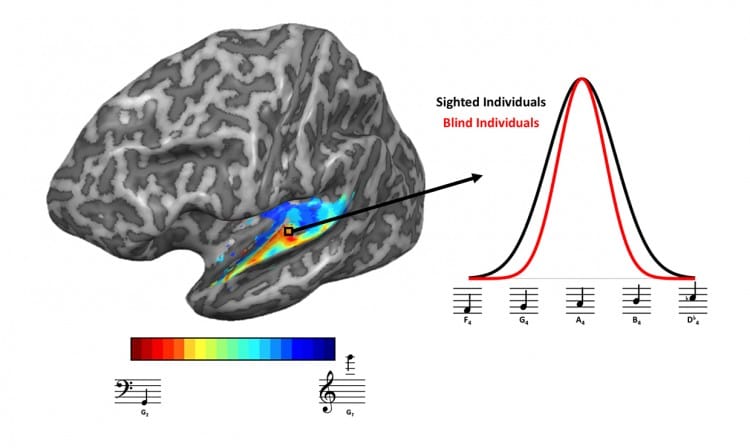There is an opinion that blind people have better hearing than sighted people. We checked whether this is supported by medical evidence and scientific research.
The question of whether blind people really hear better than sighted people has been of concern to many for a long time. Journalists asked them Channel One, BBC and others Russian And foreign Media. This information can be found on popular science And medical resources. Sellers place it on online shopping sites for people with problems vision And hearing. Internet users ask about this on services questions And answers.
People who were born blind or who lost their sight during life do sometimes respond to sounds better than those who have all five senses, and receive more useful information from them. However, this is not associated with the development of any superpowers. People hear thanks to the reaction to sound vibrations of the so-called hair cells located in the ear. The cells process the resulting vibration into an electrical signal that is transmitted to the brain. These hair cells are formed in the womb, do not grow throughout life, and if they die, they are not restored. Thus, if a person has lost his sight, he cannot in any way acquire more acute hearing than the one with which he was born. That is, his ability to pick up sounds will not improve.

However, back in 2015 it was scientifically proventhat blind people can detect, for example, the source of a sound better than sighted people. And a year earlier, scientists found outthat the areas of the brain responsible for vision are also actively working in blind people, and precisely when they are trying to get an idea of the appearance of an object or its location, that is, in fact, they need visual information. How is this possible?
The fact is that different areas of the brain are responsible for processing signals from different sense organs. And if one of the senses is lost, the brain can rebuild and use the unused area to process signals from those organs that are still functioning. That is, if a person loses vision, the brain is able to “give” the area that was responsible for it to processing sound information. At the same time, scientists note: despite the fact that the brain is capable of such reorganization throughout life, it is in childhood, when it is still developing, that such changes can occur most easily and quickly. This is due to the fact that in early childhood the brain, in fact, does not even need to rebuild anything special. He initially adapts to given circumstances, and does not change an already established system, as happens in such cases in adults.
To confirm this hypothesis, biologists conducted experiment. They asked three groups of subjects—those who were fully sighted, those who were blind at an early age, and those who lost their sight as adults—to rate sound tones and determine which one was higher. The best results in all cases were shown by the group of people who lost their sight in childhood or were born with blindness.
Therefore, it can be argued that the effect of more perfect hearing is most expressed in people with congenital blindness and those who lost their sight at a very early age. The same thing, by the way, applies to tactile perception: the earlier a person goes blind, the easier and faster the brain “replaces” vision with touch.

In addition, blind people often master echolocation - the ability to understand by the movement of sound waves where this or that object is located and to navigate in space. Bats and dolphins, for example, have this innate skill they need to survive, but humans can also master it. By making various sounds, such as clicking the tongue, a person can understand where he is, whether there are obstacles in front of him and how far away they are. Moreover, with a certain amount of persistence, even a sighted person can learn echolocation, but for blind people it will be easier and better. Proventhat the visual cortex of the brain reacts to information obtained through echolocation in almost the same way as to visual images in sighted people, that is, it can largely replace vision. For those who see normally, it will be more difficult to learn echolocation, since the brain will need to allocate additional resources for this, while blind people have weakly activated visual centers that can be reoriented to processing echolocation data.
In 2019, a group of scientists during research performed several functional magnetic resonance imaging (fMRI) procedures. Nine blind people and a control group of people without vision problems took part in this experiment. At the same time, biologists paid attention not to how quickly the brain reacts or which areas of it are involved, but specifically studied the auditory cortex of blind and sighted people and compared its reaction to subtle differences in sound data. As a result they found outthat due to vision loss, not only the visual cortex of the brain undergoes changes and adapts to receiving information from other sources, the auditory cortex also changes. Since blind people rely more on hearing than sighted people, they essentially train it and the areas of the brain that are responsible for it. Scientists have concluded that people with congenital blindness and those who became blind at an early age are better at perceiving subtle differences in auditory information than people with normal vision, for whom these data are not so important.

On the left in the picture above, warm colors represent areas of the brain that respond better to low tones, and cool colors to high tones. On the right is a study showing that blind people are better at distinguishing the features and nuances of each sound than sighted people. It is worth noting that all blind people who participated in the experiment lost their vision either at a very early age or did not have it at all. It is unknown whether these results would hold true for people who became blind as adults.
One more thing study, conducted by the same authors, helped to find out that blind people better perceive information about moving sound sources. fMRI showed that the brains of sighted people hardly react to the fact that sounds are in motion, while blind people perfectly perceive this information by ear - their neurons react to it. Moreover, two people who were blind until adulthood took part in this experiment, and then doctors were able to restore their vision through surgery. And they also responded to the movement of sounds. That is, in childhood, the neural connections that are responsible for this have already been formed in their brains, so acquired vision does not in any way prevent them from still subtly perceiving sound information.
Thus, blind people not only hear better (the ability to hear is innate and cannot improve in any way during life), but they perceive and interpret the received sound information much better. This is where the idea came from that if one of the senses is absent, the others become more acute.
Cover photo: Daredevil, dir. F. Abraham, S. Serdzhik, stage. S. Lee, B. Everett, D. Goddard, music. D. Pesano, 2015
Mostly true
Read on the topic:
- Is it true that earlobe piercing can affect your vision?
- Is it true that reading from a screen damages your eyesight?
If you find a spelling or grammatical error, please let us know by highlighting the error text and clicking Ctrl+Enter.






